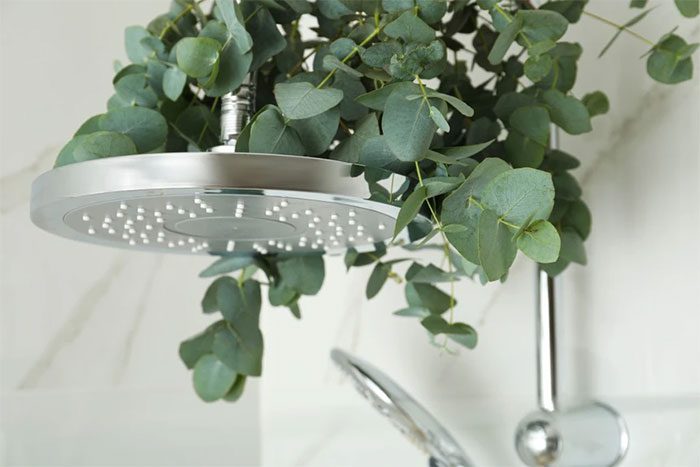Eucalyptus (commonly known as eucalyptus) is a genus of flowering plants in the myrtle family, Myrtaceae. Members of this genus are native to Australia. Eucalyptus leaves have numerous health benefits, ranging from medicinal uses to promoting fresh breath…
Health Benefits of Eucalyptus Leaves
1. Rich in Antioxidants
While you cannot consume eucalyptus oil (as it can be toxic), you can use dried eucalyptus leaves to brew tea without adding essential oils to enjoy many health benefits. Eucalyptus leaves are excellent sources of antioxidants, particularly flavonoids – a group of antioxidants that help protect the body from oxidative stress and damage caused by free radicals.
The main flavonoids in eucalyptus include catechin, isorhamnetin, luteolin, kaempferol, phloretin, and quercetin. A diet rich in these compounds has been shown to provide protective effects against the risk of cancer, heart disease, and dementia.
According to Healthline, a large study involving 38,180 men and 60,289 women found that a diet high in flavonoids reduced the risk of heart disease by up to 18%.
Dried eucalyptus leaf tea is an effective source of these beneficial antioxidants and is safe for adults. Note that children are at risk of eucalyptus toxicity and require professional consent before use.

The eucalyptus tree. (Image: Internet).
2. Eucalyptus Leaves May Help Reduce Cold Symptoms
According to Healthline, eucalyptus leaves are commonly used as a natural remedy for colds and are an ingredient in many cold and cough medications. Research from NCBI has shown that eucalyptus leaves contain eucalyptol, also known as cineole, which is found in high concentrations in eucalyptus oil.
This compound acts to reduce mucus, dilate the bronchi and bronchioles in the lungs, and improve asthma symptoms.
The antibacterial effects of eucalyptus leaves can benefit those with respiratory illnesses. Studies indicate that compounds in eucalyptus leaves are effective against infections caused by Haemophilus influenzae and Streptococcus.
You can use eucalyptus leaves through inhalation oils to alleviate cold symptoms. This ingredient is also found in many topical decongestion medications. However, even a small amount of eucalyptus oil can be toxic, so it should not be used directly without a carrier oil. It is best to consult a healthcare provider before using eucalyptol or changing medications containing this ingredient.
3. Improve Dry Skin
Eucalyptus leaves contain a significant amount of macrocarpal A, which stimulates the production of ceramides in the skin – a type of fatty acid that plays a role in maintaining the skin’s protective barrier and moisture – when used topically. People with skin issues such as dry skin, dandruff, and conditions like eczema and psoriasis often have lower ceramide levels in their skin.
As a result, many products for dry skin and hair contain extracts from eucalyptus leaves.

Do not use eucalyptus leaf extract directly. (Image: Internet).
4. Potential Pain Relief Benefits
Eucalyptus contains several anti-inflammatory compounds such as cineole and limonene that may act similarly to pain relievers. According to Healthline, a 3-day study involving 52 individuals undergoing knee replacement surgery showed that inhaling eucalyptus oil diluted in almond oil for about 30 minutes daily significantly reduced pain levels compared to inhaling pure almond oil.
However, some comparative studies have found that inhaling eucalyptus essential oil did not provide significant improvement, indicating that further research is needed before concluding the appropriate dosage and duration for use.
5. Promote Relaxation
Eucalyptus contains the main component eucalyptol, which has been found to possess anxiety-reducing properties by affecting the sympathetic nervous system – your body’s stress response system – and increasing the activity of the parasympathetic nervous system, promoting subsequent relaxation.
According to Healthline, inhaling eucalyptus oil for 30 minutes can help lower blood pressure in patients after knee surgery, suggesting its potential effects in soothing the nervous system.
6. Support Healthy Teeth
Eucalyptus leaf extract may enhance oral health due to its high content of ethanol and macrocarpal C – a type of polyphenol. These compounds are associated with reduced levels of bacteria that cause cavities and gum disease.
This is why eucalyptol is often added to mouthwash.

Eucalyptus leaf extract can improve oral health due to its high content of ethanol and macrocarpal C. (Image: Internet)
7. Natural Insect Repellent
Eucalyptus oil is a natural insect repellent; the higher the eucalyptus content in the oil, the longer and more effective its insect-repelling effects, lasting up to 8 hours after application. The Centers for Disease Control and Prevention (CDC) has listed lemon eucalyptus oil – derived from the lemon eucalyptus tree – as a powerful insect repellent.
However, do not apply essential oil directly to the skin as it may cause irritation.
Additionally, eucalyptus oil has potential in treating lice, proving to be twice as effective as conventional lice treatments. However, more research is needed before it can be used widely.
8. Antibacterial Properties
Eucalyptus leaves contain compounds that inhibit bacterial growth. Essential oil made from eucalyptus leaves can suppress the growth of certain bacteria and combat bacterial infections. According to VeryWell, a study showed that using medications containing eucalyptus leaves with phytochemical components was effective in treating some antibiotic-resistant bacteria.
9. How to Use Eucalyptus Leaves
Eucalyptus leaves can be used directly or in various ways, such as:
- Brewing tea with dried eucalyptus leaves
- Adding eucalyptus essential oil to a diffuser as an aromatherapy method
- Hanging fresh eucalyptus leaves in the shower or bath for relaxation
- Insect repellent using lemon eucalyptus essential oil
- Relieving nasal congestion by adding a few drops of eucalyptus essential oil to a carrier oil like coconut oil and applying it to the chest…
10. Health Risks

If you are pregnant or breastfeeding, avoid using eucalyptus oil.
Although considered safe, eucalyptus leaves can also pose some health risks related to the consumption of eucalyptus oil, which can cause toxicity. Children are at a higher risk of eucalyptus poisoning, leading to seizures, difficulty breathing, decreased consciousness, and even death. Thus, the answer is no, children should not use eucalyptus oil.
Furthermore, there is insufficient evidence to determine whether pregnant or breastfeeding women can use eucalyptus oil. Therefore, if you are pregnant or breastfeeding, it is best to avoid using eucalyptus oil.
Some cases of contact dermatitis have been reported when eucalyptus oil is applied directly to the skin; it is advisable to use a carrier oil to dilute eucalyptus oil before application, such as coconut oil or jojoba oil, to reduce the risk of skin irritation. Test a small amount on the wrist area before using it on the body.
Finally, eucalyptus oil may interact with certain medications, such as those for diabetes, high cholesterol, acid reflux, and mental health disorders. Discuss with your healthcare provider before planning to use this oil.
Benefits of Hanging Eucalyptus Leaves in the Bathroom
Eucalyptus oil – and the compound 1,8-cineole contained within – has been shown to have anti-inflammatory, antioxidant, antibacterial, and pain-relieving effects, according to an article in Alternative Medicine Review. This oil is released from the tree when it is crushed or distilled with steam, such as during a hot shower.
How to Hang Eucalyptus Leaves in the Bathroom
Preparation: 3 – 12 stems of fresh or dried eucalyptus leaves tied together with a string. Depending on the size you want, you can prepare more eucalyptus stems.
Instructions:
- Clean the leaves at the bottom to tie the stems together.
- Hang or tie the prepared bundle of eucalyptus to the shower rod or another area in the bathroom, ensuring that it is not directly under the running water.
- Replace the bundle every 3 weeks or so (when the eucalyptus scent is no longer detectable).
Notes
– Eucalyptus oil can cause skin and eye irritation, especially when not diluted with a carrier oil (water and oil do not create a more diluted mixture). For this reason, you should avoid placing eucalyptus leaves directly in the stream of running water, especially hot water. Instead, utilize the steam from the shower to release the oil into the air.

Do not place eucalyptus leaves directly under running water. (Image: Internet).
Moreover, swallowing eucalyptus oil directly can cause seizures in some cases, so it is essential to keep eucalyptus leaves away from water to prevent splashes into the eyes or mouth.
– Discontinue using eucalyptus leaves in the bathroom if you experience signs of irritation or allergy, such as hives or even anaphylaxis.
– Not suitable for children or pregnant women.
According to the U.S. Food and Drug Administration (FDA), eucalyptus oil is not recommended for children or women who are pregnant, planning to become pregnant, or breastfeeding unless directed otherwise by a doctor.
Overall, hanging eucalyptus leaves in the bathroom not only provides a fresh and pleasant environment but also offers numerous health benefits, from reducing stress to improving air quality and supporting the respiratory system. However, we must remember that everyone has different body responses, and using natural remedies should not replace medical diagnosis and treatment.



















































